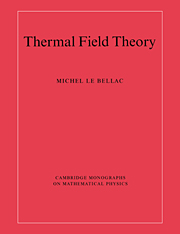Book contents
- Frontmatter
- Contents
- Preface
- 1 Introduction
- 2 Quantum statistical mechanics
- 3 The scalar field at finite temperature
- 4 Simple applications of perturbation theory
- 5 Dirac and gauge fields at finite temperature
- 6 Collective excitations in a plasma
- 7 Hard thermal loops and resummation
- 8 Dynamical screening
- 9 Neutrino emission from stars
- 10 Infrared problems at finite temperature
- A Formulary
- B Operator formalism
- References
- Index
5 - Dirac and gauge fields at finite temperature
Published online by Cambridge University Press: 05 May 2010
- Frontmatter
- Contents
- Preface
- 1 Introduction
- 2 Quantum statistical mechanics
- 3 The scalar field at finite temperature
- 4 Simple applications of perturbation theory
- 5 Dirac and gauge fields at finite temperature
- 6 Collective excitations in a plasma
- 7 Hard thermal loops and resummation
- 8 Dynamical screening
- 9 Neutrino emission from stars
- 10 Infrared problems at finite temperature
- A Formulary
- B Operator formalism
- References
- Index
Summary
Up to now we have been living in a world of scalar particles. Of course this is not sufficient when dealing with the real world, where spin one-half and spin one particles play a prominent role, and we have to learn how to quantize Dirac and gauge fields at finite temperature. The quantization of Dirac fields is a rather straightforward generalization of what we have already learned. As in the zero-temperature case, the quantization of gauge fields is more subtle, and we shall study in some detail the gauge field propagator and the role of the unphysical degrees of freedom. In the final section of this chapter we shall generalize the results of section 4.4, by deriving the rate for photon and lepton pair production from a quark–gluon plasma.
The Dirac field at finite temperature
Coherent fermion states and path integrals
As a preliminary step, we generalize to the case of fermions the path integral formalism which was set up in chapters 2 and 3. We first consider an elementary case, which is the transposition to fermions of the simple harmonic oscillator of chapter 2.
- Type
- Chapter
- Information
- Thermal Field Theory , pp. 86 - 113Publisher: Cambridge University PressPrint publication year: 1996
- 1
- Cited by

